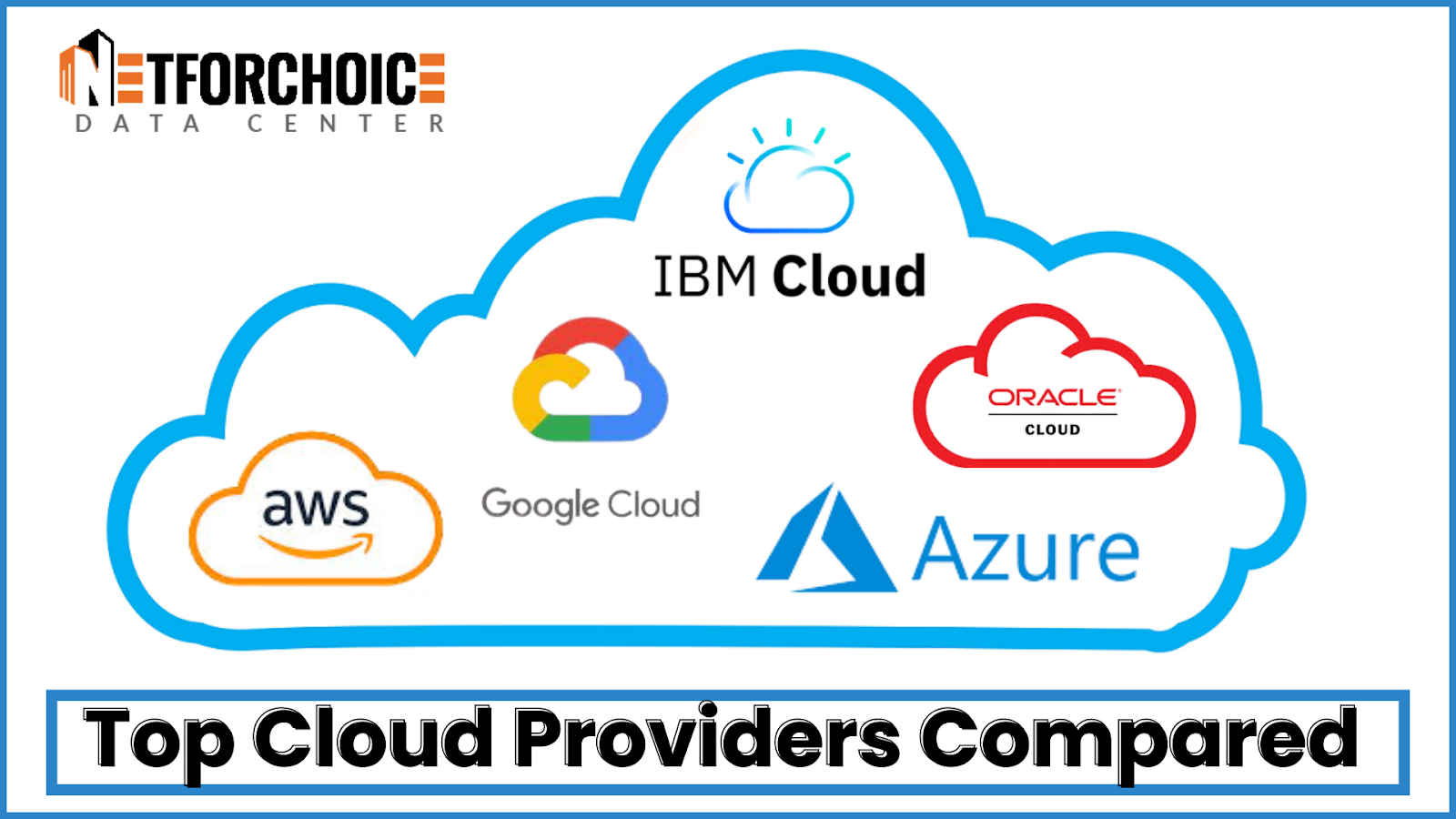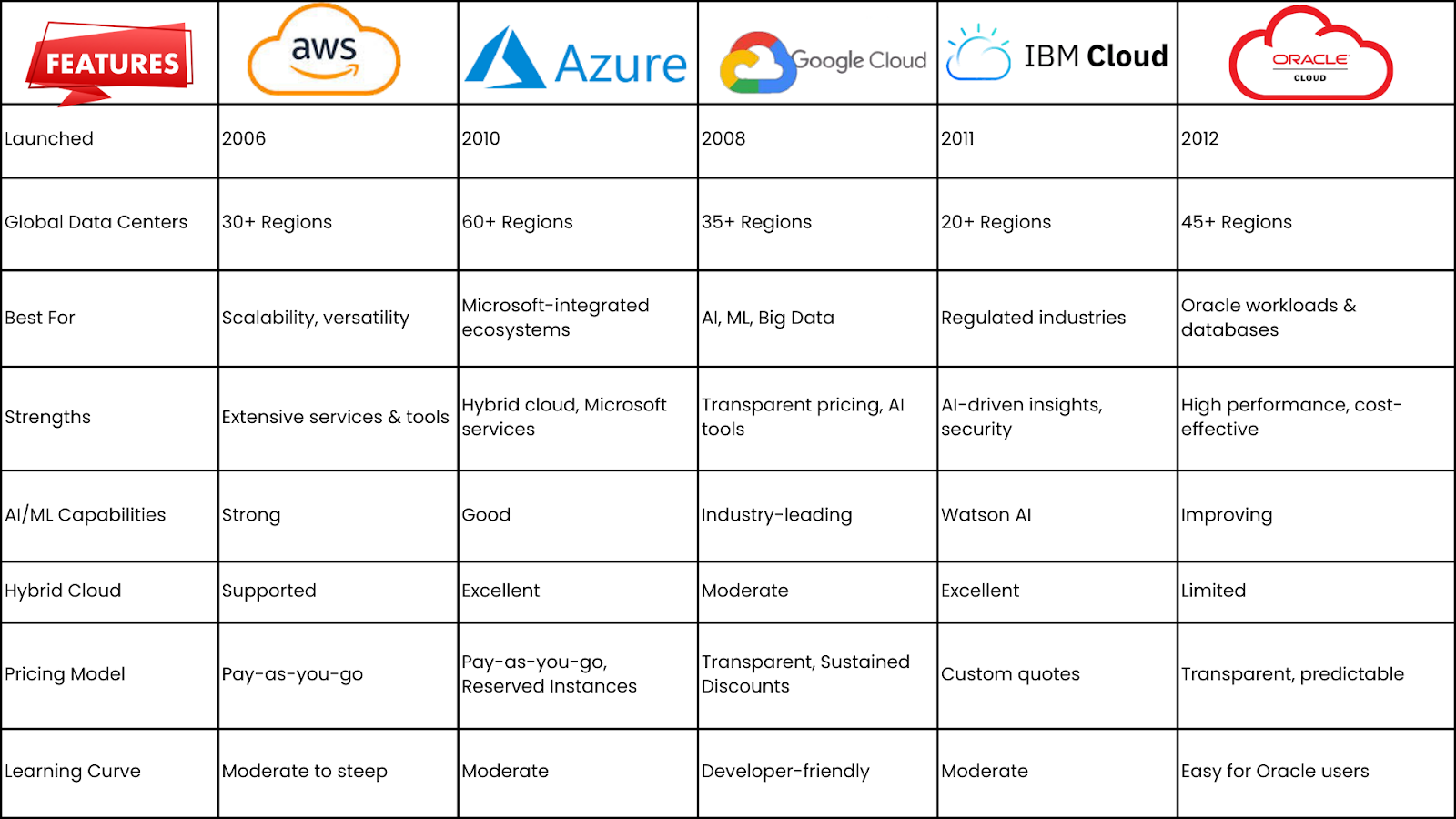Top Cloud Providers Compared: AWS, Azure, Google Cloud, IBM, and Oracle

Top Cloud Providers: Introduction
Selecting a suitable cloud provider is one of the most critical choices an organization can take during its journey online. As scalable, high-performance, secure infrastructure becomes ever more important with increasing dependence on cloud, businesses are required to weigh up which platform suits them best for present and future operation needs.
The leaders in the market are Amazon Web Services (AWS), Microsoft Azure, Google Cloud Platform (GCP), IBM Cloud, and Oracle Cloud Infrastructure (OCI), all having distinct capabilities. They might all provide reliable computation and storage capabilities as well as tools for developers, but their vendor ecosystems, pricing models, and key strengths are entirely different from one another.
This blog will unpack the differences and similarities between these providers — so you can find the best provider for your strategy, whether that’s to continue managing legacy systems, developing applications that leverage AI or supporting companies who need high-volume data processing.
Why Choosing the Right Cloud Providers Matter
Your cloud provider will determine everything from operational effectiveness to IT costs in the long run. The choice impacts how you scale, innovate, and keep your data secure. Each of the providers offers its own set of strengths — whether it is AWS’s far-reaching infrastructure, Azure’s business integration, or GCP’s AI innovation.
Incorrectly selecting providers may result in incompatibility, cost escalations, and poor performance. Therefore, the right evaluation of providers against your immediate and long-term needs is the key to success.
Amazon Web Services (AWS)
AWS was launched in 2006, and continues to be the most popular and feature-rich cloud platform in the world. It has more than 200 services for numerous services including computing, storage, machine learning, security, and more. AWS provides a tremendous level of flexibility and capability to scale or shrink depending on needs, making it a great cloud services option for individuals, small businesses, and large enterprises alike.
AWS has over 30 global infrastructure regions and over 400 edge locations globally which means your users will experience maximum availability and minimal latency wherever they are. Although AWS is very powerful, it also comes with a complicated pricing model and a steep learning curve for new users. Nevertheless, for organizations looking for performance, richness of services, and community support, AWS remains a top choice.
Microsoft Azure
Microsoft Azure launched in 2010 and quickly became a leader due to its deep integration with Microsoft tools like Windows Server, Active Directory, and Office 365. Azure is particularly appealing to enterprises that already rely on Microsoft technologies, as it offers a seamless transition to the cloud.
Azure is strong in hybrid cloud capabilities, which allow businesses to run workloads both on-premise and in the cloud. It also supports a wide array of services, including AI, IoT, and DevOps tools. While Azure matches AWS in many areas, users sometimes find the portal and billing systems to be more complex. Still, if your organization is built around the Microsoft ecosystem, Azure is a natural fit.
Google Cloud Platform (GCP)
GCP, introduced in 2008, is known for its innovation in artificial intelligence, machine learning, and data analytics. Its products like BigQuery, Vertex AI, and Kubernetes Engine make it the top choice for data-intensive businesses and software developers who prioritize performance and speed.
One of GCP’s biggest strengths is its pricing model, which is transparent and competitive. It offers sustained use discounts automatically and supports multi-cloud and open-source technologies, giving developers a lot of flexibility. However, it lacks the enterprise maturity and service depth of AWS and Azure. For organizations that rely heavily on AI or have a developer-first approach, GCP offers an unmatched experience.
IBM Cloud
IBM Cloud takes a different approach compared to the other providers, focusing on hybrid cloud environments and enterprise-grade AI. It integrates tightly with Red Hat OpenShift and provides a wide range of bare-metal and virtual machines, giving companies full control over their infrastructure.
IBM Cloud is particularly popular among highly regulated industries like finance and healthcare due to its compliance offerings and data security capabilities. Its Watson AI services and Cloud Paks also help enterprises deploy intelligent applications quickly. Although IBM Cloud doesn’t enjoy the same market share as AWS or Azure, its niche focus on security, AI, and hybrid models gives it a strong edge in specific sectors.
Oracle Cloud Infrastructure (OCI)
Oracle Cloud is designed with performance and cost-efficiency in mind, especially for workloads that rely heavily on Oracle applications and databases. It has built a reputation for running high-performance computing tasks at a fraction of the cost of AWS and Azure, thanks to its flat-rate and transparent pricing.
OCI’s Autonomous Database is one of its most powerful offerings, enabling self-patching, self-tuning, and high availability with minimal manual intervention. While Oracle Cloud is not as broad in service variety as others, it shines in database management and enterprise applications. It’s ideal for businesses that are already integrated into the Oracle ecosystem and want optimal performance and pricing.
Cloud Providers Feature Comparison

Security, Compliance, and Global Reach
All five providers meet global standards for security and compliance, including ISO 27001, GDPR, HIPAA, and SOC certifications. However, their approaches vary:
- AWS and Azure have the most extensive compliance libraries and security tools.
- Google Cloud integrates AI-driven security features into its infrastructure.
- IBM Cloud focuses on secure, hybrid models for sensitive industries.
- Oracle Cloud provides robust built-in security for enterprise data workloads.
In terms of global infrastructure, AWS and Azure lead the pack, followed by GCP. IBM and Oracle are rapidly expanding their footprints to close the gap
Final Verdict: Which Cloud Providers is Right for You?
Each cloud provider excels in different areas:
- AWS: Most versatile and scalable.
- Azure: Best for enterprises with Microsoft tech stacks.
- GCP: Top choice for AI, ML, and analytics.
- IBM Cloud: Ideal for hybrid cloud with high security.
- Oracle Cloud: Perfect for Oracle-centric businesses.
Ultimately, your decision should depend on your organization’s:
- Existing infrastructure
- Budget
- Technical capabilities
- Industry-specific compliance needs
Why NetForChoice is the Smart Choice for Managed Cloud Services
As a leading Managed Cloud Service Provider, NetForChoice delivers:
- Support across AWS, Azure, GCP, IBM, and Oracle
- Scalable cloud environments customized to your needs
- 24/7 managed support, migration assistance, and cloud consulting
- Secure, compliant, and cost-effective infrastructure management
Whether you’re launching a startup or running an enterprise workload, NetForChoice helps you make the most of your cloud investment — without the complexity.
Top Cloud Providers: Frequently Asked Questions (FAQs)
Q1. Who is the best cloud provider in 2025?
AWS and Azure remain at the top, but GCP and Oracle are quickly closing the gap, particularly for niche use cases
Q2. Is using multiple clouds a smart move?
Indeed. Using multiple clouds allows you to take advantage of each platform’s best features and lessen vendor lock-in.
Q3. Which is more economical, Azure or AWS?
Your workload will determine this. While Azure provides better pricing for environments that use Microsoft, AWS is more flexible.
Q4. How can I move from on-premises to the cloud?
End-to-end cloud migration strategies are aided by managed service providers such as NetForChoice.
Q5. Do these cloud service providers adhere to international laws?
Yes, every major provider complies with SOC, GDPR, HIPAA, and other regulations.
Submit Your Query

